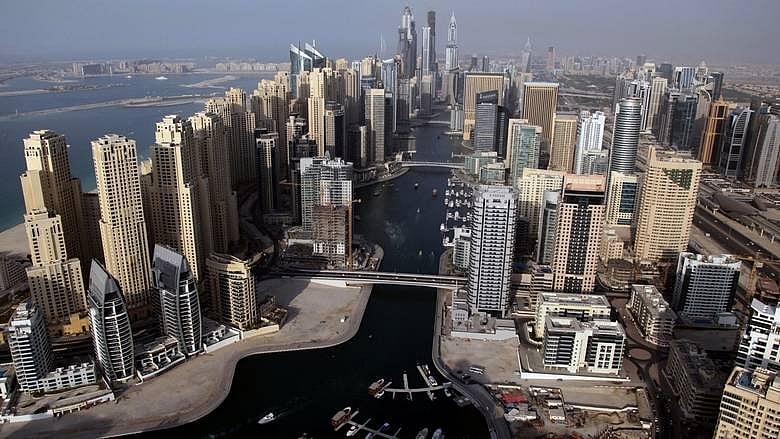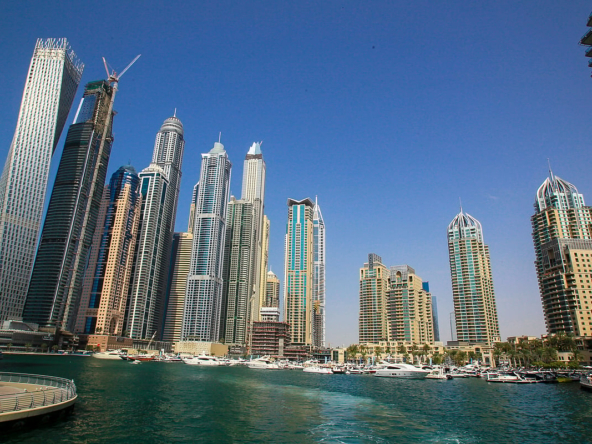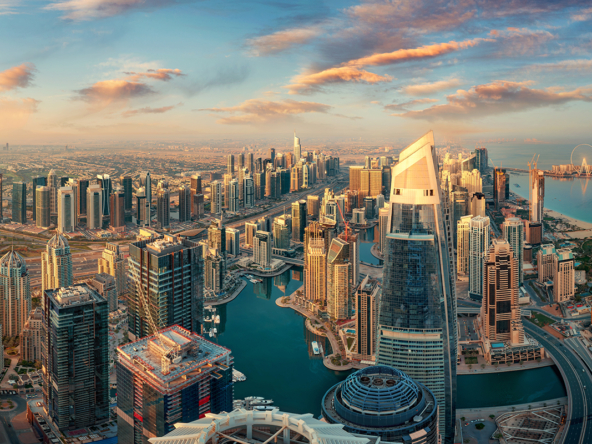Dubai’s Real Estate Market Sees Significant Growth in Q1 2025
Dubai’s real estate sector experienced notable growth in the first quarter of 2025, with residential property sales increasing by 22.4% year-on-year and the total value of these sales rising by 29.6%, according to a recent report by Engel & Völkers Middle East. Commercial real estate also saw an 18.2% increase in sales, with a 29.5% uptick in the total transaction value.
Despite the typical seasonal slowdown from the previous quarter, the residential market demonstrated widespread growth. Off-plan sales rose by 23.9%, while secondary market transactions increased by 20.3%, indicating sustained demand across various price points.
Apartments continued to dominate the residential market, accounting for 76% of all transactions. Jumeirah Village Circle led in both off-plan and resale apartment sales, driven by competitive pricing, strong rental yields, and convenient access to major road networks. The secondary market also showed momentum in areas like Business Bay, Dubai Marina, and Downtown Dubai, which are popular among investors and end-users for their connectivity and amenities.
The villa segment stood out with an 80.6% year-on-year increase in transactions, primarily fueled by off-plan activities in emerging communities such as The Valley, Emaar South, and Damac Islands. The total transaction value for villas rose by 55.1%, reflecting a growing preference for affordable, family-oriented housing in newer developments on the outskirts of Dubai.
In the luxury and ultra-luxury market, Dubai maintained its strong performance. Sales of properties priced above Dh10 million grew by 29% compared to Q1 2024 and have surged by 185% since Q1 2022. Palm Jumeirah and the emerging Palm Jebel Ali accounted for 31% of these high-value sales, driven by demand for ultra-luxury waterfront villas. Notable transactions included the Dh425 million sale of the Marble Palace in Emirates Hills and a Dh115 million villa in Palm Jumeirah’s EOME community, facilitated by Engel & Völkers Private Office Advisor Fadi Alsalem.
Dubai continues to attract high-net-worth individuals, with the number of resident millionaires increasing by over 100% in the past decade, according to Henley & Partners. The UAE attracted more HNWIs than any other country in 2023 and 2024. Currently, Dubai is home to more than 81,000 millionaires, 237 centi-millionaires, and 20 billionaires, a number expected to rise as global wealth shifts towards stable, high-performing destinations.
The rental market also reflected sustained demand, with over 51,000 new residents added in the first quarter. While rent increases are stabilizing, luxury apartments in Bluewaters saw a 14.1% year-on-year growth, and villas and townhouses in Dubai Hills Estate and Arabian Ranches experienced increases of 33.8% and 20.6%, respectively.
Commercial Real Estate Sector Shows Upward Trend
The commercial real estate sector continued its positive trajectory, with office, retail, and mixed-use segments all recording gains. Office sales transactions increased by 40%, and the average price per square foot rose by 15% to Dh1,676. Business Bay and JLT remained key hubs for Grade A office space, recording 315 and 217 sales, respectively. Off-plan interest in Capital One positioned Motor City as a leading office investment destination in Q1. Retail sales grew by 6% year-on-year, concentrated in thriving residential and mixed-use communities such as Business Bay, Arjan, and JVC.
Leasing activity also accelerated, with a 17.6% quarter-on-quarter increase across the commercial sector. Office rents grew by 23% year-on-year to Dh112 per square foot, driven by demand in core business districts like Business Bay, JLT, and Dubai Investments Park. Retail rents remained steady at Dh240 per square foot, but increasing demand for Grade A space suggests potential upward pressure on pricing in the latter half of the year.
“In the face of global economic uncertainty, Dubai’s real estate market continues to show excellent fundamentals, with cross-sector growth and compelling returns for investors,” said Daniel Hadi, CEO of Engel & Völkers Middle East. “Demand is being fueled not just by regional wealth and migration, but by strategic policy, infrastructure investment, and the city’s global positioning as a future-forward hub for living and business.”
Recent infrastructure announcements, including the acceleration of the Etihad Rail project, the rollout of the Dubai Loop system, and strategic road upgrades in central business zones, are expected to further enhance the city’s competitive edge.
Major commercial projects announced in Q1 2025, such as the Dh5 billion redevelopment of Mall of the Emirates, signal strong confidence from Dubai’s top developers in the long-term resilience of the city’s retail and consumer sectors.
As Dubai continues to attract global investors, business leaders, and new residents, Engel & Völkers remains optimistic about the outlook for the remainder of 2025. “From prime residential to commercial real estate, Dubai is increasingly seen as a safe haven for capital and a high-performance market that rewards long-term vision,” Hadi added.
Robust investor confidence, population growth, and infrastructure investment continue to fuel cross-sector expansion




